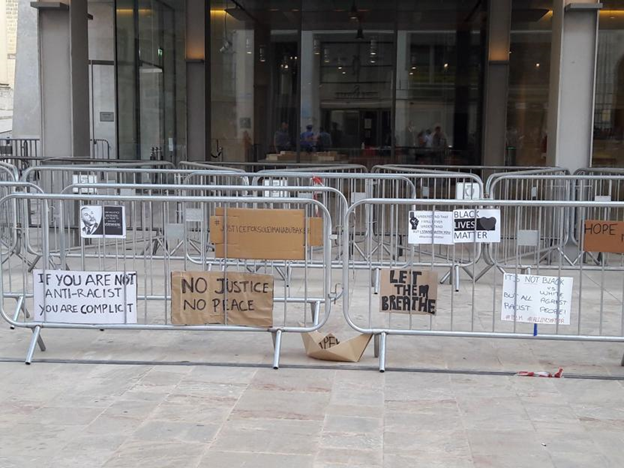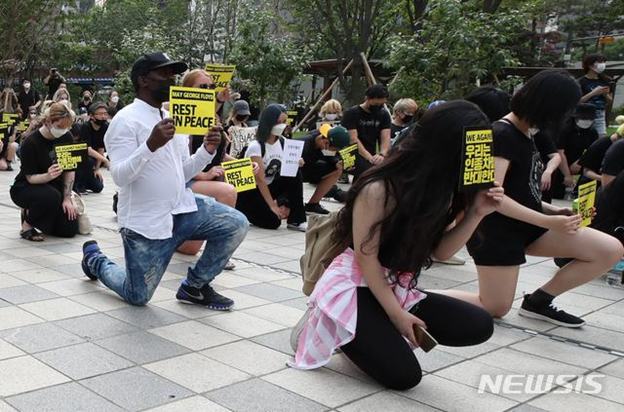By Stuart Johnson
The following was compiled, sourced, and written in association with my colleagues from The American University of Paris: Evan Floyd, Ki Byung Park, Karl Baldaccino, and Husam Ibrahim.

Mural of George Floyd on Chicago Avenue in Minneapolis, Minnesota.
Image Credit: North Central University
Over the past two weeks, as protests over George Floyd’s death have broken out across America, people around the world have reacted powerfully and passionately. In some countries, demonstrators have joined in solidarity - vowing to highlight and even subvert their own countries’ political, social, and historical ties to racism. In others, government figures have used the opportunity to criticize the US for representing a ‘double standard’ when it comes to human rights, democracy, and police brutality.
Below are brief summaries of respective countries' notable moments that exemplify these phenomena:
United States

In Concord, the protesters rallied first at Memorial Field before marching through town to the State House, chanting and holding signs for racial justice.
Image Credit: Josie Albertson-Grove / Union Leader
According to the USA Today, protests have now taken place in over 700 US cities including Washington D.C., New York, Seattle and Philadelphia. Legislative responses to the protests have been noticeably swift. Last Monday, Democrats in the House of Representatives introduced the Justice and Policing Act of 2020. In the Republican-held Senate, South Carolina's Tim Scott and Utah's Mitt Romney have vowed to introduce similar legislation. Over the weekend, Romney was spotted at a large Black Lives Matter demonstration in Washington D.C. and told NBC News, "We need to stand up and say, 'Black lives matter.’”
Paris, France – Reported on by Evan Floyd, Husam Ibrahim and David Sohmer

Photo from the #blacklivesmatter and #justicepouradama protest at the Tribunal de Paris.
Image Credit: David Sohmer
In Paris, two different groups joined forces: Black Lives Matter, focusing on George Floyd's death in Minneapolis, and Justice for Adama, focusing on Adama Traoré’s death in 2016. Initially, authorities barred people from gathering in front of the US Embassy due to concerns related to the COVID-19 pandemic; however, thousands protested there anyway, as well as on the Champ de Mars in front of the Eiffel Tower. The below was reported first-hand from Evan Floyd; who attended the protest.
Outside the U.S. Embassy
Before the protest started, the Seine's bridges were closed off. Police vans and officers blocked the paths connecting the right and left bank. A friend and I got to the first location an hour early taking the metro. We had plans to meet up with people but the metro was unavailable soon after we arrived. Before the crowd was organized, a woman yelled “Black lives matter. My life matters,” at officers behind the gate surrounding the embassy. There was chanting for George Floyd, it shifted to Breonna Taylor and ended on Adama Traoré.
Champ de Mars
Journalists and photographers surrounded us before the police. They tried to conduct interviews or capture us with our signs. We called for justice. We shouted for the lives that were lost. The police were told the whole world hated them. There were arrests going on away from the crowd; we chose to stay in the thick of it. A few officers held camcorders, pointing them at us behind their body shields. A friend flipped them off. My group was shocked yet excited at the sight of a man dressed as Jesus. We saw more officers arrive and tried to figure out our exit strategy; the police were all equipped with gas masks and allowed for one exit. Signs were collected and bags opened but we ran back in to recollect and redistribute items to their owners.
Malta - Reported on with the help of Karl Baldaccino, Luca Splendor & Peter Hili

Protesters place placards on barricades in front of Maltese Parliament, demanding justice for black lives.
Image Credit: Karl Baldaccino
On Monday night, around 300 Black Lives Matter demonstrators gathered before the Maltese Parliament holding signs that read “proud to be black” and “we are all migrants” where they were met by a rival group of anti-migration protesters holding up signs that read, “we are not racists, we are patriots.” A tense standoff ensued, and police had to step in to separate the two groups.
Since April 2019, controversy has swirled in the country surrounding what many Maltese politicians and the police have denounced as the racially-motivated killing of Lassana Cisse – a migrant worker from the Ivory Coast. To date, two members of the Maltese armed forces, Francesco Fenech and Lorin Scicluna, have been charged with his murder.
Ghana

The President of Ghana, Nana Akufo-Addo, took the opportunity to denounce Mr. Floyd’s killing as well as to offer his condolences to the family, writing the above on Twitter. Peaceful demonstrations were also organized by the Diaspora Coalition and held in front of the US embassy in Accra.
In addition to protests, this past Friday Ghana joined a coalition of 54 African countries calling for an urgent meeting by the United Nations Human Rights Council (UNHRC) to look into instances of police brutality and violence against people of African descent – most notably in the United States. The UNHRC has not met since March 13th, and is planning to open next week. In order for such a meeting to be held, it needs to have the backing of at least one member nation.
South Korea - Sources from Ki Byung Park

Protesters taking a knee in Hanbit Park in Cheonggyecheon, Seoul.
Image Credit: Newsis, Kim Myung-won
According to the Newsis News Agency, protests in Seoul were organized by Shim Ji-hoon (34), who used Facebook to organize a group of about 100 demonstrators. When interviewed at the march, he commented that Korea was dealing with some of the same issues as the US: "Korea is no longer a single-ethnic country...there are issues of racial discrimination such as bullying of children from multicultural families or aversion to Korean-Chinese. The gaze on black people is similar...I hope that this march will give awareness to the issue of racism in Korean society.”
The march was initially planned to take place in front of the US embassy, but instead demonstrators marched silently from Myeong-dong, Seoul to Hanbit Square, Cheonggyecheon, wearing black clothes and pickets in honor. There, they knelt for eight minutes and forty-six seconds - the length of time officer Minneapolis Police Department’s Derek Chauvin’s knee was on Mr. Floyd’s neck.
China

Chinese diplomat Hua Chunying responds to U.S. Department of State’s Morgan Ortangus on May 30th.
Image Credit: Twitter.
Since Floyd’s death, Chinese government officials along with state-owned print and online media have used the opportunity to reverse criticism of their own government’s handling of the protests in Hong Kong back onto the US for their own aggressive police response to the protests in US cities that have turned violent. China’s Foreign Ministry spokesman Zhao Lijian accused the US of supporting a ‘double standard’ when it comes to human rights and democracy, going as far calling Hong Kong recent police’s tactics as being “very restrained” in comparison to those of the US police. In response, Secretary of State Mike Pompeo has criticized China for exploiting George Floyd’s death for political gain.
This heated back and forth all came on the eve of the 31st anniversary of the Tiananmen Square student-led protests quelled by the Chinese state. The timing has not been lost on a number of Chinese officials and news outlets – who in particular have pointed to the Trump Administration’s vow to use the military to quell protests as justification for their own government’s actions. In the current context, that parallel is specifically being drawn to justify China’s move to pass the Hong Kong National Security Law.
Among other capitals, demonstrators also took to the streets in Ottawa, Vancouver, Stockholm, Athens, Milan, Mexico City, Auckland, Amsterdam, and Warsaw - a truly unprecedentedly passionate demonstration of just how widespread the outrage, anguish, and hope for a more just future the death of George Floyd has brought about.


